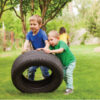
by Kelly Cox
Parent Coach & Trainer at Connective Family
The transition from childhood dependency to adult independence – it’s scary stuff!
We often think of teenagers appearing in our homes the morning after their 13th birthday, like the scene from Kevin and Perry. But actually pre-teens or ‘tweens’ develop from about eight to 12 years of age.
During this time our tweens often start to worry more about what other people think of them, they may become more self-conscious, keen to fit in with peers and even confident children can become more insecure. This can be a time where we start to see bullying.
So, what can we do as parents to stay connected with our children while they navigate these years?
Our parenting journey is an ever-changing landscape of rough roads, smooth country lanes and mountains, which is why being able to adapt to our child’s needs is crucial if we want to create a calm and connected home life.
Prioritise self-care
The most important thing we need to remember is that we cannot pour from an empty cup. Parenting leads us to pour from our cups constantly throughout the day, so looking after ourselves is crucial.
When we practise self-care, we allow ourselves to self-regulate more often and to allow ourselves to be less reactive to stressful situations. For some, self-care is small daily acts and for others is weekly or monthly acts. It’s whatever works for you, find what you need to help you to stay connected and calm.
Remember, it takes a village to raise a child
It’s important that, as parents and carers, we are connected with others who have a positive impact on us and our families.
Some examples of this might be:
• Maintaining positive relationships with teachers and support staff at your schild’s school.
• Encouraging positive relationships between children and sports coaches.
• Having positive relationships with friends and wider family.
• Asking for help when needed from appropriate people.
Keep up the parental presence
Being able to maintain a positive connection with our children is key to making them feel safe and supported, which in turn has a positive impact on behaviour and wellbeing.
You can increase parental presence in a number of ways to suit you and your child. Some simple ways you can do this include:
• Watching a movie of their choice with them.
• Popping your head in to see if they want a drink or a snack.
• Being in the room with your child.
• Going for walks or drives in the car together.
• Giving them a lift somewhere or picking them up.
• Spending time one-to-one with them doing something they enjoy.
• Taking an interest in a hobby or interest that they have.
Think connection over correction
We’re not saying that we should never correct our children but if we think and practise connection first, we often don’t need to correct.
If a child behaves in a way that we do not approve of, then it’s important that we try and think why they may be behaving in this way.
What are they trying to tell us or what are they trying to gain from this?
We often hear adults saying that children are just ‘attention seeking’. However, if we reframe this and think of it as though they are ‘attention needing’ or ‘attachment seeking’, it leads us to think more about connection rather than correction.
Tweens or teens will often push away from their parents (remember your tween and teenage days!?) so it’s important that we maintain a connection but also allow them to have a little more freedom. This transition between childhood dependency and adult independence can be a scary process for many children, particularly if they do not have the skills to navigate this.
And finally…
We so often hear so much negativity around teenagers, but if we stop and think about what they are navigating in life and the changes in their adolescent brain, then we realise how truly amazing they are!
They’re finding their way through education, friendships, relationships with teachers and other adults, handling intense emotions, changing bodies and external pressures such as social media. And they’re told, often daily, that choices they make today will affect the rest of their lives – despite the fact that their prefrontal cortex, the part of the brain responsible for planning, prioritising and making good decisions, is the last to develop.
The tweenage brain is a wonderful thing!
Kelly Cox is a parent coach and trainer at Sussex-based Connective Family,
an organisation supporting parents, carers and their families.











